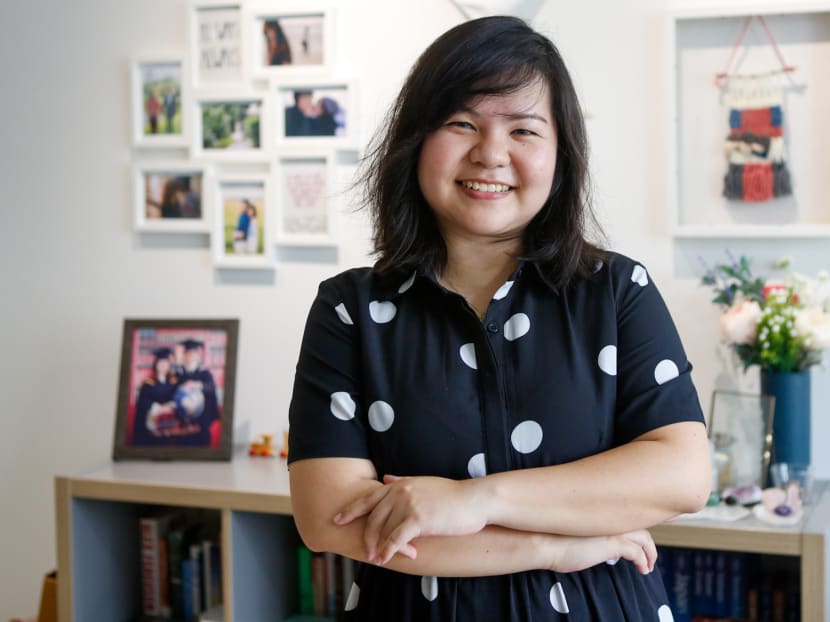Hard road to being a mum: Young, ready to have a baby, but then breast cancer struck
SINGAPORE — When Ms Kelly Chung was diagnosed with early-stage breast cancer in 2016, the fear of not being able to have children after treatment hit her harder than her diagnosis.

With an increasing number of women battling breast cancer in their childbearing years, Ms Kelly Chung (pictured) wants to raise awareness of the most common women’s cancer in Singapore.
SINGAPORE — When Ms Kelly Chung was diagnosed with early-stage breast cancer in 2016, the fear of not being able to have children after treatment hit her harder than her diagnosis.
Only 28 then, Ms Chung was months away from getting married to her fiance. They had plans to try for a baby immediately after their marriage.
Although she was shocked when the doctor broke the news of the diagnosis to her, Ms Chung, now 32 and works as a personal assistant, recalled being relatively calm. It was only when she learnt that chemotherapy — one of the common cancer treatments — could make her infertile that she broke down.
“My fiance, who was with me at the time, was distraught and feared for my life. Having children wasn’t on his mind.
“But to me, the thought of not being able to have (biological) children made me really sad,” she said.
They postponed their wedding to December 2017 and shelved plans to start a family.
With an increasing number of women battling breast cancer in their childbearing years, Ms Chung wants to raise awareness of the most common women’s cancer in Singapore.
Not only do younger patients have to face their own mortality earlier, many also experience other unique personal challenges, such as infertility, after treatment.
WHY ARE MORE YOUNG WOMEN GETTING CANCER?
The age-standardised incidence rate of breast cancer has climbed in the last five decades. This is a measure of the rate of disease that a population would have if it had a standard age structure, given that there are different age profiles under consideration.
Figures from the Singapore Cancer Registry showed that there had been a threefold increase: From 1968 to 1972, it was 20.1 for every 100,000 in the population. From 2013 to 2017, it was 69.8.
Consultant breast and general surgeon Esther Chuwa told TODAY that about 10 to 13 per cent of breast cancer patients in Singapore are below the age of 40, compared to the reported 5.5 to 7 per cent in the West.
It is the one of the most common cancers here in women aged 15 to 39.
Dr Chuwa, who is the medical director of Esther Chuwa BreastCare Practice at Gleneagles Medical Centre, said that the upward trend of cancer in younger women may be due to a combination of environmental and lifestyle factors.
They include obesity, physical inactivity and an earlier exposure to female hormones due to earlier puberty — all of which contribute to a risk of breast cancer.
Dr Chuwa pointed out that obesity in children and adolescents, for example, has increased 10-fold in Singapore in the past 40 years.
In girls, obesity can lead to early-onset puberty, which leads to a greater lifetime exposure to female hormones, thereby increasing the risk of breast cancer.
Dr Chuwa said that the majority of breast cancers — about 70 to 80 per cent — are estrogen receptor-positive, which means that the cancer will grow in response to the presence of the female hormone, estrogen.
Other possible reasons for the upward trend include increased alcohol consumption and women delaying childbirth. Both are risk factors for breast cancer.
HOW DOES CANCER TREATMENT AFFECT FERTILITY?
In younger women, breast cancer tends to be more aggressive and grow faster, necessitating more aggressive treatments such as chemotherapy, Dr Chuwa said.
A common concern for young patients is thus the possibility of treatment-induced infertility.
In a survey of 657 women with breast cancer where the average age of diagnosis is 33, more than half of them recalled having substantial concerns about fertility after treatment, Dr Chuwa said.
In the 2004 study report published in the American Journal of Clinical Oncology, it also states that around 29 per cent of the women said that their fertility concerns influenced treatment decisions.
Dr Chuwa, who treated Ms Chung, said studies have found that up to 40 per cent of women under the age of 40 enter permanent menopause as a result of chemotherapy.
“Women are born with a finite number of eggs, or ovarian reserve, that progressively mature and get released monthly during their reproductive years.
“Chemotherapy can damage the ovaries reducing the ovarian reserves and damage its ability to produce female hormones, leading to early ovarian failure or menopause,” she said.
However, the younger the woman, the more eggs she has in her ovaries. “This gives a higher chance to preserve some fertility in spite of damage from treatment,” Dr Chuwa said.
Anti-hormone treatments used to treat breast cancer can also affect fertility or cause birth defects, she added.
Some may suppress ovulation, putting the woman into temporary menopause.
Although this is reversed when the treatments stop, the anti-hormone treatments are typically recommended for many years. Over time, natural fertility may decline, Dr Chuwa said.
“This means finding a balance between curing these women of their cancers and preserving an acceptable quality of life that includes fulfilling some life goals.
“If the risk of cancer relapse can be honestly discussed with them, they are usually sensible and accept that they need to be healthy and cancer-free before mothering a child,” she added.
WHAT ARE THE OPTIONS TO PRESERVE FERTILITY?
Dr Elaine Lim Hsuen, senior consultant at the division of medical oncology in the National Cancer Centre Singapore (NCCS), advised patients to discuss the risks and benefits of cancer treatment, as well as their fertility preservation options with a gynaecologist to make an informed decision.
There are several ways to preserve fertility during treatment, and the method used varies from patient to patient.
They may include freezing the embryos, eggs or ovarian tissue in a procedure called cryopreservation.
Another option is to suppress the ovaries with medication to make them more resistant to the damaging effects of chemotherapy.
If chemotherapy is the treatment recommendation, Dr Lim said that the gynaecologist will take into account the level of urgency to start chemotherapy. This is discussed with the oncologist.
“Ovarian tissue cryopreservation takes the least time, so it minimises the delay to start chemotherapy. In this way, standard of oncological care is not compromised.
“However, if the patient forgoes chemotherapy for the sake of preserving her fertility, there is potential impact on outcomes and risk of cancer recurrence,” Dr Lim said.
Given Ms Chung’s young age, Dr Chuwa said that she may still retain some fertility after chemotherapy and her risk of permanent ovarian failure is less than 40 per cent.
However, one of Ms Chung’s top priorities in life is to start a family and this was why she underwent a special test to ascertain if she required chemotherapy.
ASSESSING THE NEED FOR CHEMOTHERAPY
After undergoing a mastectomy to remove her right breast, Ms Chung sent her tissue samples to a company in the United States for a test called the Oncotype DX.
It is a type of gene expression profiling, and Dr Lim said that it used to predict the risk of cancer recurrence and the need for chemotherapy in selected breast cancer patients.
They include those who have early-stage disease, where the disease has not affected the lymph nodes; patients whose cancers are estrogen receptor (ER) positive or progesterone receptor (PR) positive; and patients who have HER2-negative breast cancer, where HER2 is a protein.
Other factors are also considered, such as the patient’s tumour size, age, wishes and preference, Dr Lim added.
Based on results showing a low recurrence rate of her cancer, Ms Chung decided to omit chemotherapy from her treatment plan.
“I gave the test a go because if I were to have chemotherapy, I would probably still have to freeze my eggs as I intend to have children. That would similarly add to the costs. I also did not want to take the chance to have my fertility affected in any way,” she said.
The test cost around $6,000 to $7,000 and was covered by her health insurance.
Dr Lim said that NCCS does not perform the Oncotype DX test but it can help arrange for the breast tumour tissue sample to be sent to the US for analysis.
Dr Chuwa orders around 20 to 25 of such tests a year in her clinic. About four in five women who undergo the tests did not require chemotherapy.
She said that the test has demonstrated consistent results in predicting cancer recurrence outcomes across multiple studies, including a large trial that enrolled more than 10,000 women with early-stage breast cancer in six countries.
STARTING A FAMILY AFTER CANCER
After her mastectomy, Ms Chung was put on hormonal therapy that caused her to go into menopause to prevent cancer recurrence. She would have to be on the medication for 10 years.
Six months ago, she halted the treatment temporarily, hoping to conceive.

In theory, pregnancy could increase the chance of breast cancer recurrence, particularly for women with hormone-responsive ER positive breast cancers, Dr Chuwa said.
“This is because ER positive breast cancer is fuelled by oestrogen, and the fear is that hormone levels during pregnancy could stimulate any occult cancer cells remaining in the body to grow and spread,” she said.
Still, it is a risk that Ms Chung is willing to take. She also suffers from a hormonal disorder called polycystic ovary syndrome and is now trying to regulate her periods to conceive.
Her oncologist has given her about a year or so to try for a baby.
“I can’t stop my medication for too long, and will have to resume my medication immediately after I give birth. Our fertility doctor seems positive. We are following his methods closely, and are hoping for the best,” she said.
Ms Chung said that her family and husband, a 30-year-old engineer, have been her source of strength in this journey.
She has also found a silver lining: “My husband and I dated for six years before we got married and our relationship has always been stable. But the cancer has built an even stronger foundation for our marriage. Whatever it is, we know we’ll stick with each other,” she said.
Ms Chung urged other young women to do regular breast self-checks and not be afraid to face up to illness.
“Breast cancer is one of the more treatable cancers. If you find out about your illness early, there is a higher chance of recovery,” she said.
Dr Chuwa said women below the age of 40 are not recommended to undergo routine mammogram screenings because mammograms are less effective in detecting cancerous changes in dense or thick breast tissue in young women compared to older women.
For the younger age group, being “breast aware” through regularly monthly breast self-examinations is the key to early diagnosis, Dr Chuwa said. Look out for symptoms such as breast lumps or unusual nipple discharge.






